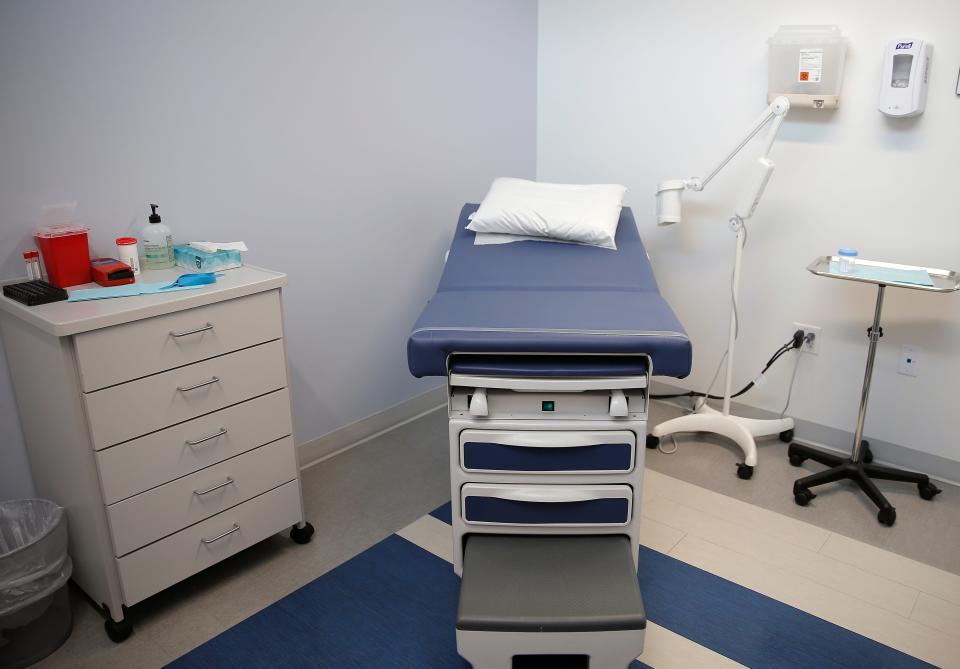End of Roe makes abortion a crime in Oklahoma as state's abortion 'trigger' law takes effect
Performing an abortion became a criminal offense in Oklahoma on Friday after state Attorney General John O'Connor certified that the U.S Supreme Court had overturned the constitutional right to abortion.
Anyone who performs an abortion at any point after fertilization in Oklahoma can now be subject to penalties ranging from two to five years in prison. The life of the mother is the lone exception. A woman having an abortion would not be charged.
“Oklahoma’s law is very clear now,” O’Connor said at a news conference. “Law enforcement is now activated in respect to any effort to aid, abet or solicit any abortions.”
Secretary of Health and Mental Health Kevin Corbett said the Oklahoma State Department of Health had revoked the licenses of abortion clinics in Oklahoma.
Oklahoma leaders react: The Supreme Court overturns Roe v. Wade abortion decision

A law that will increase the potential penalties to 10 years and a fine of $100,000 for performing an abortion is set to go into effect on August 26. That law also makes an exception only “to save the life of a pregnant woman in a medical emergency.”
Gov. Kevin Stitt said he had vowed during his campaign four years ago to sign every anti-abortion bill sent to him by the Legislature.
“I am thrilled to have kept that promise,” he said.
The laws do not prohibit contraception or fertility treatments, he said.
More: What Roe v. Wade being overturned means for Oklahoma
The U.S. Supreme Court on Friday overturned the landmark 1973 ruling in Roe v. Wade that women have a constitutional right to terminate a pregnancy before a fetus is viable and the 1992 ruling in Planned Parenthood v. Casey that reaffirmed the right.
“We hold that Roe and Casey must be overruled,” the court said in a 6-3 decision. “The Constitution makes no reference to abortion, and no such right is implicitly protected by any constitutional provision, including the one on which the defenders of Roe and Casey now chiefly rely — the Due Process Clause of the Fourteenth Amendment.”
Hours later, O’Connor certified that Roe and Casey had been overturned, triggering enactment of an Oklahoma law that states: “Every person who administers to any woman, or who prescribes for any woman, or advises or procures any woman to take any medicine, drug or substance, or uses or employs any instrument, or other means whatever, with intent thereby to procure the miscarriage of such woman, unless the same is necessary to preserve her life, shall be guilty of a felony punishable by imprisonment in the State Penitentiary for not less than two (2) years nor more than five (5) years.”
O’Connor said the law, originally passed in 1910, used the word miscarriage, which had been construed to mean abortion.
Oklahoma is among about a dozen states with so-called “trigger laws” that were enacted to outlaw abortions if the Roe and Casey decisions were overturned. Those laws went into effect in at least six states on Friday: Arkansas, South Dakota, Kentucky, Louisiana, Missouri and Oklahoma.
Center for Reproductive Rights officials said they plan to file lawsuits challenging trigger laws in some states, but it’s not clear if litigation could be filed in Oklahoma.
“We do expect there will be challenges filed to trigger bans in a number of states,” said Julie Rikelman, senior director of litigation for the group.
However, Rikelman declined to say which states the Center for Reproductive Rights might sue and how soon those lawsuits could be filed. Expect litigation to be filed “in the coming days," she said.
Clinics in Oklahoma already had ceased providing abortion since the governor signed into law House Bill 4327 in May.
That law bans abortions from the point of fertilization with limited exceptions by allowing private citizens to sue anyone who performs an abortion, or “aids or abets” someone in getting an abortion.
A poll taken in December showed less than one-third of Oklahoma voters wanted a ban on all abortions and only Republicans were deeply divided on the question.
The poll, taken by Amber Integrated of 500 registered Oklahoma voters, showed 31% would support a total ban on abortion if the U.S. Supreme Court overturned Roe v. Wade; 55% of the Oklahoma voters surveyed did not want a total ban and another 14% were unsure.
Only 14% of Democratic voters and 12% of independents said they would favor a total ban on abortion if the 1973 ruling was tossed. On the Republican side, 48% of those voters surveyed said they would support a total ban, while 40% would not.
Only 29% of women and 33% of men surveyed favored a total ban on abortion.
“This shows that most voters cannot simply be placed into a ‘pro-life’ or ‘pro-choice’ dichotomy,” said pollster Jackson Lisle, a partner in Amber Integrated, of Oklahoma City.
Contributing: Staff writer Carmen Forman
This article originally appeared on Oklahoman: What the fall of Roe v. Wade means for Oklahoma's abortion trigger law

